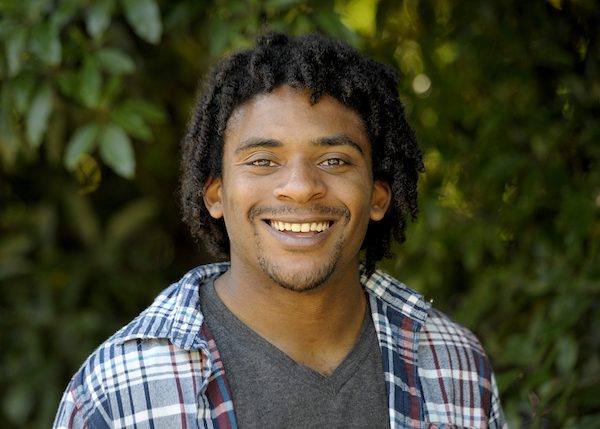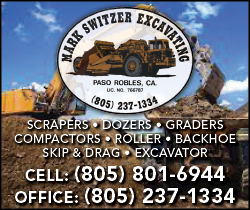Cal Poly grad, former Bearcat hopes to compete in 2020 Olympics

2013 Paso Robles High School alumnus and recent Cal Poly Grad Cameron Andrews.
–Last week, Cal Poly said goodbye to roughly 4,500 graduates, one of the largest classes in Cal Poly history. Each has a unique story of success and perseverance along with thoughts on how their university experience has shaped them as they ready to make their way in the world.
2013 Paso Robles High School graduate, Cameron Andrews said he found Cal Poly’s Learn by Doing philosophy to be a “tremendous catalyst” as he pursued a psychology degree. “It gave me hands-on experience into what it would be like in the workforce,” said the 21-year-old, “and a better understanding of the things I would like to do in the future.
“Cal Poly impacted me in a way that all colleges should. It helped me grow, mature and expand my perspective. The past four years really has shown me who I am, what I love and where I want to grow.”
Andrews plans to pursue a doctorate in psychology at the University of Michigan. But first he will head to Alaska through the AmeriCorps program. “I will be working with veterans, who suffer from post-traumatic stress disorder, and the homeless population to help to integrate them into society,” he said.
Andrews, who competed on the track team, recalls his pride at representing Cal Poly and “what it means to be a Mustang — our tenacity, spirit and pride.” He was hampered by injuries that affected his development in the long jump and triple jump. A hamstring injury closed the door on his track career, but it didn’t end his days as an athlete. His coach is training him to become an Olympic weightlifter.
“Whatever technical skills I lacked as a track and field athlete, I made up with raw strength,” said the 5-foot-9 Andrews. ”Pound for pound, I was the strongest person on the team. I’d give some of the guys who weighed 100 pounds more then me a solid run for their money and in certain lifts beating them. I remember when everyone’s jaws dropped; me — a 155-pound dude — was squatting 405 pounds five times, for sets of five.”
“(My coach) believes I can become an Olympian and that I have what it takes to compete in the next Olympics in Tokyo in 2020,” he said. “I believe that I can do it.”
Q and A with Cameron Andrews
What is your career goal?
I think the biggest career goal is to do something that I’m passionate about and that’s fulfilling. So, right now that encompasses really wanting to help people. To achieve that, the goal is to go all the way with my schooling and get my Ph.D. in either clinical psychology or biopsychology and go from there!
What’s next after graduation? Job? More schooling? Something else?
So, after graduating I will actually be going to Anchorage, Alaska, though Americorps. I will be working with veterans who suffer from PTSD and the homeless population, and help to integrate them into society. After that, I’ve been in communication with the University of Michigan so after my time in Alaska I plan on getting my Ph.D. there! However, I realize that life rarely if ever goes according to plan, so I’m open to whatever opportunities or changes life will throw at me.
Why did you choose to attend Cal Poly?
My twin sister was going to the local community college close to home, and since my hometown was from Paso Robles, I decided to work and commute my freshman year to be the least amount of a financial burden on my parents. However, I’m really happy that I ended here and everything worked out for the best!
How did Cal Poly impact your life?
Cal Poly impacted me in a way that all colleges should. It helped me grow and mature into the man I am today. Through all the triumphs and turmoil that I experienced in the past four years really as shown me who I am, what I love and where I want to grow. I’ve learned so much, not only intellectually, but personally, socially and so many other tenants and I’m thankful for it.
How did Cal Poly help meet your education goals?
The “Learn by Doing” approach is something that’s been a tremendous catalyst to effectively teach. It gave me a personal hands-on experience into what it would be like in the workforce and gave me a better understanding of the things I would like to do later on in the future. For example, I recall never being particularly interested in becoming a therapist but after taking the class “The Helping Relationship,” where I was a paraprofessional therapist with real students and real issues. For me to practice the skills we learned in class, and to actually help people and to see progress in how our clients felt was an awesome experience and I can see myself doing it as an occupation in the future.
What was your biggest accomplishment at Cal Poly?
I think my biggest accomplishment was all the relationships I created and facilitated here at Cal Poly. Whether those relationships were created during my time as a Resident Advisor, my time running Division I Track and Field here, my time through my campus jobs, or the times in my professors’ office hours and expanding on those relationships. I recall friends playfully teasing me or getting upset because I couldn’t walk through campus without being stopped, greeted or having a conversation because of the plethora of relationships I’ve made on campus. I really am proud of that because it hopefully means that I’ve made a positive impact on that person’s life one way or another, during my time here. That’s what I’m proud of the fact that I’ve made these relationships, but most importantly that they’re not shallow or surface-level but these connections are genuine and real. That at any given moment any one of these people we could get lunch, catch up and it would be as if we haven’t skipped a beat.
What was your sport? How many years did you compete?
Track and Field! Unfortunately, my collegiate track career was plagued with injuries, so the only year I was “healthy” enough to compete was my sophomore year. And even that comes with an asterisk because every meet I competed at I was injured and had to just work through the pain. After that, my coach recommended that I take my junior year off to recover and get healthy after struggling with a few injuries in the fall, and then my senior year I got a career ending hamstring injury pretty early in fall again. So, after that, I painfully decided to finally hang up the spikes.
How did it make you feel to represent Cal Poly as track meets?
Honestly, it was one of the best feelings. To have the opportunity to travel, and show what it means to be a Mustang, our tenacity, spirit and pride at meets was an honor.
What were your PRs? Did you set any school records?
If I could describe my track career, it was unrealized potential. Even though my PRs were decent, they never came close to what my coach expected and believed I could do. Being injured all the time, I never had the opportunity to even try long jump or sprint, which is all the more bittersweet, because testing marks we did at the beginning of the year indicated that I had plenty of potential … a 4.1 second 30-meter dash, or my 11-foot-1 standing broad jump. With that being said, my PR for Triple Jump was 44-foot-9. However, my coach believed and expected me to jump around 48-foot.
What challenges did you face as a student athlete in terms of academics-athletics? How were you able to meet your academic responsibilities while fulfilling your role as a track athlete?
The biggest challenge was just balancing everything out. Running collegiate sports can be synonymous to having a job because you dedicate around 15-25 hours a week, and on top of that many of us had another job! I was a Resident Advisor (where you would dedicate around 40-50 hours a week). So being an athlete and balance schooling was a challenge. Thankfully, I was able to figure out pretty early what really worked for me in terms of scheduling, priorities and so on. Once, you kind of get in a groove, it was easy to balance everything out.
Describe how you battled injuries.
I’ve been battling injuries throughout my entire Track career. Even when I competed in high school, injuries were something that plagued me for so long. We have awesome athletic trainers here, so whenever I was hurt, they’d give me a specific regiment on how to recover. Most required a lot of icing, a lot of cycling and general strength exercises.
You mentioned that your hamstring injury may have closed the door on track, but it also opened the door for other athletic opportunities. What are they?
My Cal Poly weightlifting coach recognized my potential and, after my injury, decided that he would train me to become an Olympic lifter. He believes I can become an Olympian and that I have what it takes to compete in the next Olympics in Japan 2020! It’s very exciting stuff, and I believe that I can do it. Already, I’ve set the record for some lifts in the weight room, so it’s really something special to see myself progress and for my coach to take the time and take me under his wing like that. So who knows, maybe you’ll see me competing in JAPAN in a couple of years.






















